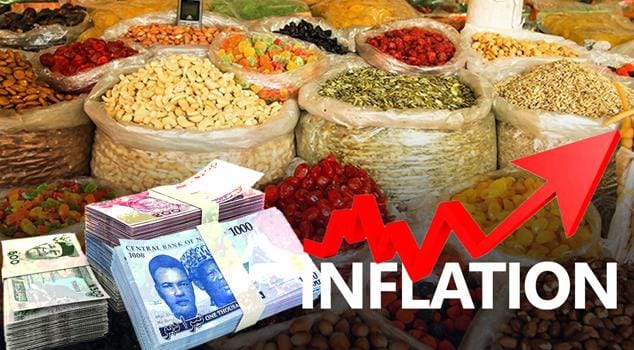Nigeria’s headline inflation rate surged to 24.23% in March 2025, according to data released by the National Bureau of Statistics (NBS) on Tuesday.
This marks a significant increase from the 23.18% recorded in February 2025, demonstrating the persistent pressure on household incomes, rising food prices, and the broader cost of living across the country.
The NBS report highlights that inflation continues to accelerate, driven largely by increases in the prices of essential food and non-food items. This has further strained the finances of millions of Nigerians grappling with sluggish wage increases and economic uncertainty.
“Furthermore, on a month-on-month basis, the Headline inflation rate in March 2025 was 3.90%, which was 1.85% higher than the rate recorded in February 2025 (2.04%). This means that in March 2025, the rate of increase in the average price level is higher than the rate of increase in the average price level in February 2025,” the NBS explained.
– Core Inflation
The report further showed that core inflation, which excludes the prices of volatile agricultural produce and energy, rose to 24.43% year-on-year in March 2025 compared to the same period in March 2024.
On a month-on-month basis, the core inflation rate climbed to 3.73%, representing an increase of 1.21 percentage points from the 2.52% recorded in February 2025.
Additionally, the headline inflation rate on a year-on-year basis stood at 24.23% between March 2024 and March 2025, while the month-on-month rate rose to 3.90% from February to March 2025, according to the NBS.
– Rural And Urban Inflation
A breakdown of the figures shows a noticeable divergence between urban and rural inflation rates:
On a year-on-year basis, the Urban inflation rate stood at 26.12% in March 2025.
On a month-on-month basis, urban inflation rose by 3.96%, compared to 2.40% in February—a sharp uptick of 1.56 percentage points.
The Rural inflation rate, while comparatively lower, also showed worrying signs:
On a year-on-year basis, rural inflation was 20.89% in March 2025.
On a month-on-month basis, it increased by 3.73%, which is 2.57% higher than the 1.16% recorded in February 2025.
Food Inflation Remains a Key Driver
Food inflation, a key contributor to headline inflation, rose to 21.79% year-on-year in March 2025, according to the NBS.
On a month-on-month basis, food inflation was 2.18%, up by 0.50% from 1.67% in February. The NBS attributed this increase to the rising average prices of staple food items such as:
Ginger (fresh)
Garri (Yellow)
Broken Rice (Ofada)
Honey (Natural Production)
Crabs, Potatoes, Plantain Flour
Periwinkle (Unshelled)
Fresh Pepper, among others.
The uptick in food prices is particularly concerning ahead of the planting season, with supply chain disruptions, logistics challenges, and insecurity in major food-producing regions compounding the issue.
– Policy Implications And Outlook
Industry experts who spoke to Nairametrics say the March inflation reading was influenced by opposing forces—some exerting upward pressure while others offering relief—resulting in a relatively stable outcome.
Head of Research at Norrenberger, Samuel Oyekanmi, cited a balance between moderating and upward factors.
“The continued effect of rebasing and favourable base effects are expected to exert a moderating influence,” he said.
However, he cautioned that the depreciation of the naira in the second half of March and the increase in petrol prices could raise costs across transport and goods.
Some analysts say the rise in inflation could put additional pressure on the Central Bank of Nigeria (CBN) to tighten monetary policy even further in a bid to rein in rising prices.
– Key Drivers Of March Inflation Rise
Analysts observed that prices of major staples remained largely flat or trended downwards in many parts of the country during the month, easing pressure on food inflation—the largest component of the CPI.
For most of March, the naira held firm following February’s gains. A stable exchange rate helped slow imported inflation, although naira depreciation towards the end of the month could still influence the final outcome.
Petrol prices remained steady in early March but recorded a slight surge towards the end of the month, introducing potential cost pass-throughs in transport and logistics.
The rebasing of inflation weights and methodology introduced earlier by the NBS continues to play a role in recalibrating inflation readings downward, at least in the short term.
Follow us for Breaking News and Market Intelligence.
WARNING: If You Are Not 18+, Don’t Click The Link Below 👇🫣
https://disloyalmoviesfavor.com/m3e85u39j?key=f0014e9d9438d5115e4d66e73ca3f04b
https://poawooptugroo.com/4/8902554
Please don’t forget to “Allow the notification” so you will be the first to get our gist when we publish it.
Drop your comment in the section below, and don’t forget to share the post.
Never Miss A Single News Or Gists, Kindly Join Us On WhatsApp Channel:
https://whatsapp.com/channel/0029Vad8g81Eawdsio6INn3B
Telegram Channel:
https://t.me/gistsmateNG




